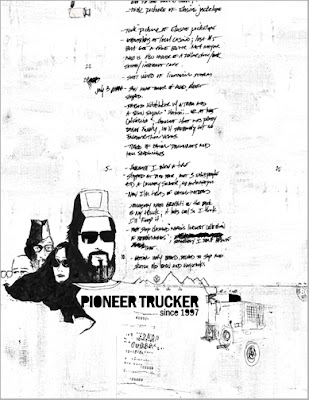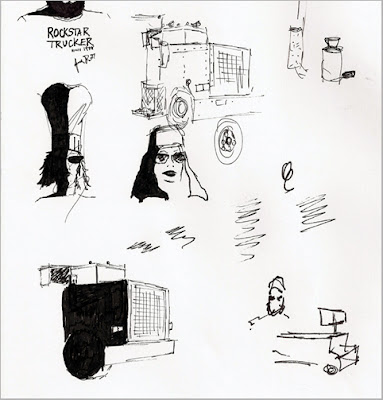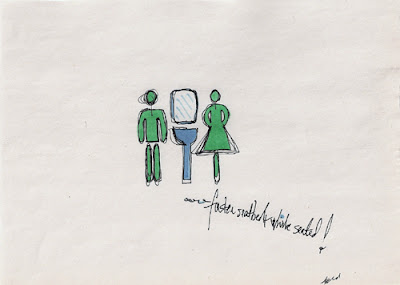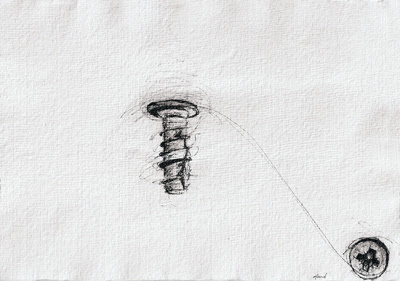Even when speakers are proficient in English, Scientific English can still present challenges. Some bill it as ‘a foreign language’ even for native English speakers. Anyone who has learned how to use it might first laugh at that comparison and then grit their teeth on the grain of truth. Learning conversational English is a big enough task. Getting good enough to build a career in science fluently using Scientific English is a Herculean task.
The post Hey, language-learning platforms! appeared first on OUPblog.
by Cassie, Publicity Assistant
Yesterday wasn’t just Lincoln’s birthday. It was also Charles Darwin’s birthday; the 200th anniversary of his birth. Rather than having Darwin get lost among all the Lincoln chatter of the day, the OUPblog decided to declare today an unofficial Darwin Day!
To start the celebration, we have an excerpt from Darwin’s Recollections of the Development of My Mind and Character, a delightfully informal autobiography originally intended for his family. This selection is taken from a new collection of Darwin’s best and most famous works, Evolutionary Writings, edited by James A. Secord.
I am not conscious of any change in my mind during the last 30 years, excepting in one point presently to be mentioned; nor indeed could any change have been expected unless one of general deterioration… I think that I have become a little more skilful in guessing right explanations & in devising experimental tests; but this may probably be the result of mere practice & of a larger store of knowledge. I have as much difficulty as ever in expressing myself clearly & concisely; & this difficulty has  caused me a very great loss of time; but it has had the compensating advantage of forcing me to think long & intently about every sentence, & thus I have been often led to see errors in reasoning & in my own observations or those of others. There seems to be a sort of fatality in my mind leading me to put at first my statement & proposition in a wrong or awkward form. Formerly I used to think about my sentences before writing them down; but for several years I have found that it saves time to scribble in a vile hand whole pages as quickly as I possibly can, contracting half the words; & then correct deliberately. Sentences thus scribbled down are often better ones than I could have written deliberately.
caused me a very great loss of time; but it has had the compensating advantage of forcing me to think long & intently about every sentence, & thus I have been often led to see errors in reasoning & in my own observations or those of others. There seems to be a sort of fatality in my mind leading me to put at first my statement & proposition in a wrong or awkward form. Formerly I used to think about my sentences before writing them down; but for several years I have found that it saves time to scribble in a vile hand whole pages as quickly as I possibly can, contracting half the words; & then correct deliberately. Sentences thus scribbled down are often better ones than I could have written deliberately.
Having said this much about my manner of writing, I will add that with my larger books I spend a good deal of time over the general arrangement of the matter. I first make the rudest outline in two or three pages, & then a larger one in several pages… Each one of these headings is again enlarged & often transposed before I begin to write in extenso. As in several of my books facts observed by others have been very extensively used, & as I have always had several quite distinct subjects in hand at the same time…I keep from 30 to 40 large portfolios, in cabinets with labelled shelves, into which I can at once put a detached reference or memorandum. I have bought many books & at their ends I make an index of all the facts which concern my work; or if the book is not my own write out a separate abstract, & of such abstracts I have a large drawer full. Before beginning on any subject I look to all the short indexes & make a general & classified index, & by taking the one or more proper portfolios I have all the information collected during my life ready for use.
I have said that in one respect my mind has changed… Up to the age of thirty, or beyond it, poetry of many kinds, such as the works of Milton, Gray, Byron, Wordsworth Coleridge & Shelley, gave me great pleasure, & even as a school-boy I took intense delight in Shakspeare… I have also said that formerly Pictures gave me considerable, & music very great delight. But now for many years I cannot endure to read a line of poetry: I have tried lately to read Shakespeare & found it so intolerably dull that it nauseated me. I have also almost lost any taste for pictures or music.— Music generally sets me thinking too energetically on what I have been at work on, instead of giving me pleasure… On the other hand, novels which are works of the imagination, though not of a very high order, have been for years a wonderful relief & pleasure to me, & I often bless all novelists. A surprising number have been read aloud to me, & I like all if moderately good, & if they do not end unhappily,—against which a law ought to be passed. A novel, according to my taste, does not come into the first class, unless it contains some person whom one can thoroughly love, & if it be a pretty woman all the better.
This curious & lamentable loss of the higher æsthetic tastes is all the odder, as books on history, biographies & travels (independently of any scientific facts which they may contain) & essays on all sorts of subjects interest me as much as ever they did. My mind seems to have become a kind of machine for grinding general laws out of large collections of facts, but why this should have caused the atrophy of that part of the brain alone, on which the higher tastes depend, I cannot conceive. A man with a mind more highly organized or better constituted than mine, would not I suppose have thus suffered; & if I had to live my life again I would have made a rule to read some poetry & to listen to some music at least once every week; for perhaps the parts of my brain now atrophied could thus have been kept active through use. The loss of these tastes is a loss of happiness, & may possibly be injurious to the intellect & more probably to the moral character by enfeebling the emotional part of our nature.
…
My habits are methodical, & this has been of not a little use for my particular line of work. Lastly I have had ample leisure from not having to earn my own bread. Even ill-health, though it has annihilated several years of my life, has saved me from the distractions of society & amusement.
Therefore my success as a man of science, whatever this may have amounted to, has been determined, as far as I can judge, by complex & diversified mental qualities & conditions. Of these the most important have been—the love of science—unbounded patience in long reflecting over any subject—industry in observing & collecting facts—& a fair share of invention as well as of common sense. With such moderate abilities as I possess, it is truly surprising that thus I shd have influenced to a considerable extent the belief of scientific men on some important points.
Richard Dawkins is the bestselling author of The Selfish Gene and The God Delusion. He’s also a pre-eminent scientist, the first holder of the Charles Simonyi Chair of the Public Understanding of Science at Oxford, and is a fellow of New College, Oxford. Called “Darwin’s Rottweiler” by the media, he is one of the most famous advocates of Darwinian evolution. His most recent book is The Oxford Guide to Modern Science Writing, a collection of the best science writing in the last century.
This is the third in a series of podcasts we’re running from an interview with Dawkins. You’ve heard him speak about Alan Turing, the father of the modern computer, and Watson & Crick, the men who discovered the shape of DNA. Now, Dawkins tells us a bit more about his new book and reflects on the men who influenced his own theories.
Transcript after the jump.
DORIAN DEVINS: Welcome Richard Dawkins. You have a book out, The Oxford Book of Modern Science Writing, which you have edited. And you personally selected all the writings that are in this?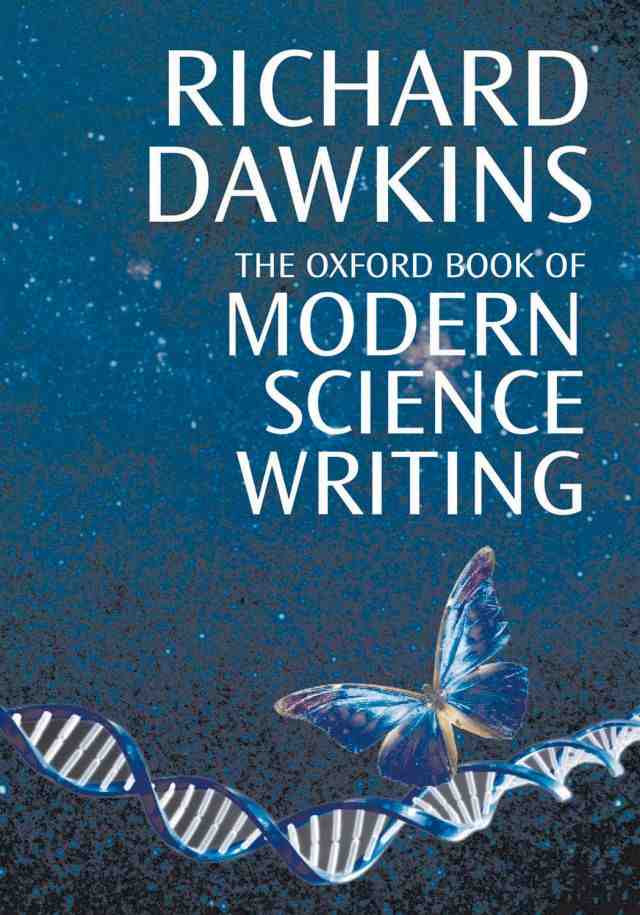
RICHARD DAWKINS: Yes, I selected them in collaboration with the OUP editor Latha Menon. We’ve worked together before; we worked together on my own collection of writings, which is called A Devil’s Chaplain. And so we worked well together, and we chose them together.
DEVINS: And how many different scientists are represented in this book?
DAWKINS: I haven’t counted.
DEVINS: It extends back to-the earliest writing is…
DAWKINS: Go back to the sort of Eddington-gene sort of time, I can’t remember what date they are, but sort of early part of the twentieth century. The decision was not to go back to the nineteenth century, that would have been a nice thing to do but it would have opened up a whole new vista which I didn’t feel like taking on.
DEVINS: And it would have necessitated your eliminating some of these people, I suspect. So, I see you have George Williams in here.
DAWKINS: George Williams was a very important influence in modern evolutionary theory. In 1966, he wrote a really seminal book called Adaptation and Natural Selection, which once and for all destroyed the theory of group selection, which was a very important thing to do at that time. And he substituted the view of evolution which I later christened the theory of the selfish gene. Williams didn’t use that phrase, but in effect the selfish gene was a new way of putting the theory that Williams had put forward in the 1960s. Oddly enough, I didn’t get it from Williams, I got it from Hamilton. Bill Hamilton, W. D. Hamilton, who’s also in the book and a very wonderful, eccentric character who I deeply loved and who died, tragically, not that long ago (about oh, well, actually maybe seven or eight years ago now). And Hamilton and Williams, I think, could be seen as the founding fathers of the selfish gene theory.
DEVINS: And what part did Hamilton bring in?
DAWKINS: Well Hamilton invented what Maynard Smith actually called kin selection; the idea that animals behave altruistically towards kin because they share genes. And in a way, you could say that everybody knew that about offspring, everybody knew about parental care, but what Hamilton showed was that the same principle as parental care works for brothers and sisters, nieces and nephews, etc.
ShareThis
I've known for a while that I wanted to use photography in my illustration work but I hadn't fine tuned the approach to the point where I felt comfortable putting some work out into the world. I knew that I didn't want my shots to have too much realism and I certainly didn't want the perfection of a digital camera. That's why I chose a polaroid camera; the slightly out of focus image, the slightly desaturated subject, the expected and unexpected imperfections. For those interested, I have more background story in my blog.
Here are two finished pieces; I'm working on six others, I'll post them when they're completed.
subject/concept: "it's still winter"
materials: pen and prismacolor marker on a polaroid photo

subject/concept: "what's missing?..."
materials: pen and prismacolor marker on a polaroid photo

© 2008 joe blend. All rights reserved.
Subject: spice rack
Materials: pen, prismacolor marker, and bay leaves on paper

© 2008 joe blend. All rights reserved.








